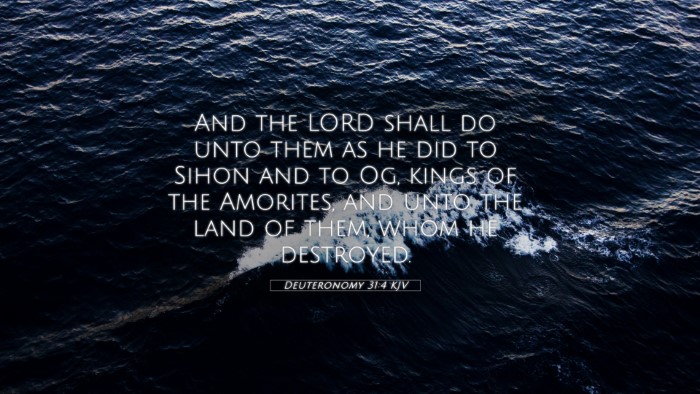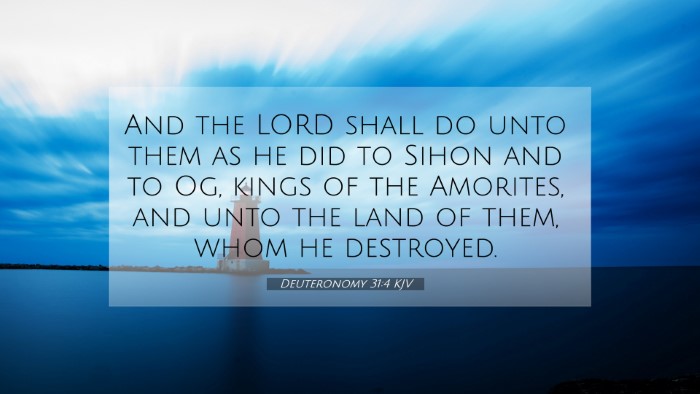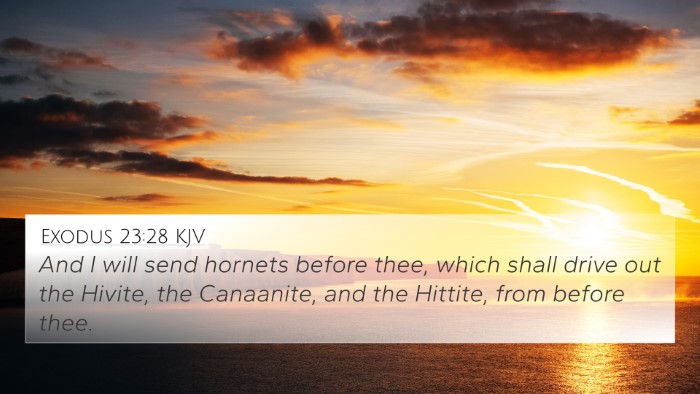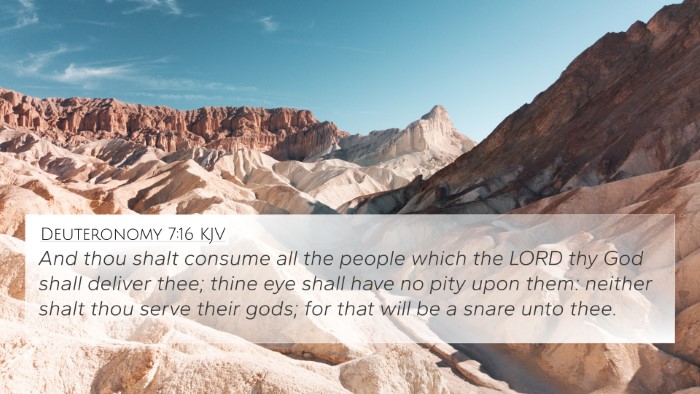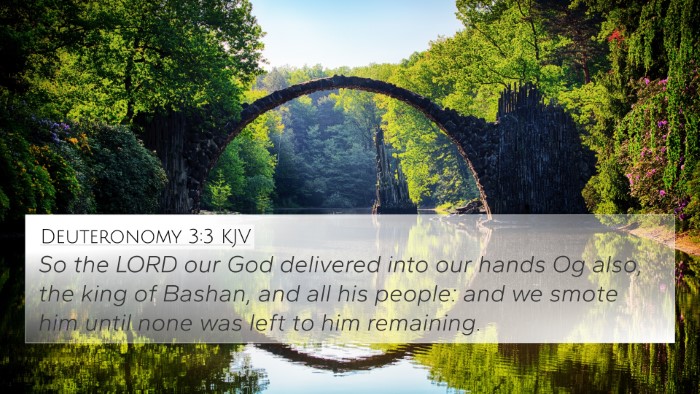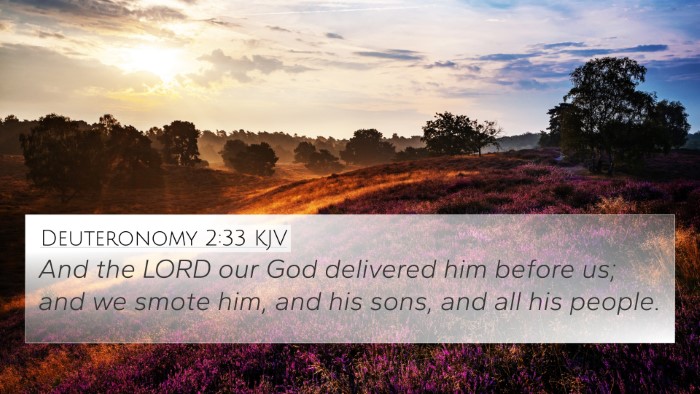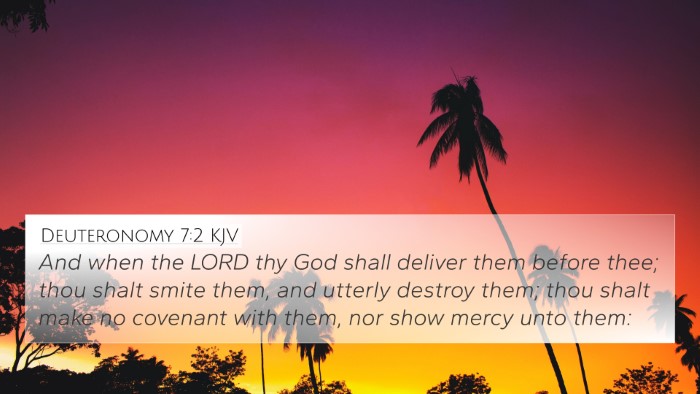Understanding Deuteronomy 31:4
Bible Verse: Deuteronomy 31:4
This verse emphasizes God's assurance to His people and His unwavering support as they face challenges ahead. The background involves Moses’ farewell address, where he prepares the Israelites for their journey into the Promised Land without his leadership.
Summary of Insights from Commentaries
- Matthew Henry: Henry highlights that this verse indicates God's promise to Israel during their transition into a new land. It reflects confidence in God's strength and an assurance that He will not abandon them, reinforcing the need for courage and faithfulness in the face of adversities.
- Albert Barnes: Barnes points out that Moses is encouraged by God’s assurance. He notes that this promise is not only for Moses but extends to Joshua and all of Israel, indicating collective support. The emphasis is on the certainty of God's presence among them.
- Adam Clarke: Clarke analyzes the implications of God's deliverance and support. He mentions that the declaration "The Lord shall do unto them as he did unto Sihon and Og" signifies that Israel should remember past victories as a source of strength and encouragement for facing future battles.
Thematic Connections
This verse forms part of a larger narrative about God's covenant and the theme of leadership transition. It offers a compelling reflection on faith, divine assistance, and the historical context of the Israelites' journey.
Cross-References
To gain deeper insights into the themes presented in Deuteronomy 31:4, consider the following Bible cross-references:
- Joshua 1:5: “No man shall be able to stand before you all the days of your life; as I was with Moses, so I will be with you; I will not leave you nor forsake you.”
- Isaiah 41:10: “Fear not, for I am with you; be not dismayed, for I am your God; I will strengthen you, I will help you, I will uphold you with my righteous right hand.”
- Hebrews 13:5: “For he hath said, I will never leave thee, nor forsake thee.”
- 1 Chronicles 28:20: “And David said to Solomon his son, Be strong and of good courage, and do it: fear not, nor be dismayed; for the Lord God, even my God, will be with thee; he will not fail thee, nor forsake thee...”
- Psalm 27:1: “The Lord is my light and my salvation; whom shall I fear? The Lord is the strength of my life; of whom shall I be afraid?”
- Romans 8:31: “What shall we then say to these things? If God be for us, who can be against us?”
- 2 Timothy 4:17: “Notwithstanding the Lord stood with me, and strengthened me; that by me the preaching might be fully known, and that all the Gentiles might hear...”
Connections between Bible Verses
Deuteronomy 31:4 shows persistent themes in Scripture concerning God's faithfulness and presence. Each cross-reference enriches the understanding of God's promise, encouraging believers to seek aligned verses to bolster faith and understanding. For instance, God's assurance of support connects Old Testament figures like Moses and David, reinforcing that God's presence is eternal and continual across biblical narratives.
Comparative Bible Verse Analysis
The analysis of related verses can provide a more significant theme of assurance in the face of uncertainties, not only in the historical context of Israel but in personal application for today’s believers. Observing the situational context of each verse, as well as their promises, enables a holistic understanding of the narrative God weaves throughout the Bible.
Tools for Bible Cross-Referencing
Utilizing tools such as Bible concordances or cross-reference guides can enhance the depth of study. Cross-referencing Bible study techniques, like thematic analyses or chain references, can illuminate connections not immediately visible within a single verse. These tools aid in tracing the intricate dialogues among Biblical texts, enriching the reader's faith and understanding.
For deeper engagement, study methods such as specifically identifying connections between Old and New Testament verses can reveal a cohesive narrative that underscores God’s steadfastness. In thematic studies like the comparative examination of Pauline epistles or the connections between the Prophets and Apostolic teachings can also yield profound insights.
Conclusion
Deuteronomy 31:4 encapsulates a vital message of encouragement for believers, emphasizing God’s abiding presence and support amid challenges. Understanding this verse through the lens of biblical commentary, context, and inter-Biblical dialogue can foster a deeper appreciation of God’s promises. As believers reflect on the integrated teachings of Scripture, they find strength, reassurance, and motivation to walk in faith, tethered to an enduring promise of God's presence.

